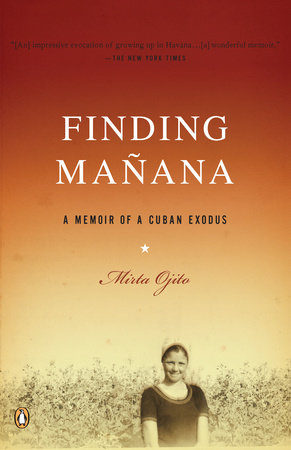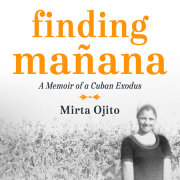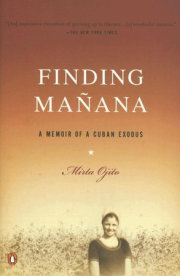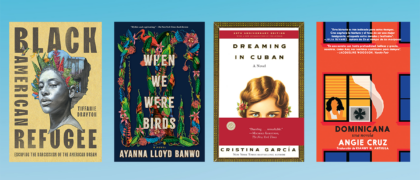From Finding Manana by Mirta Ojito
The police came May 7, 1980, when I was about to have lunch: a plain yogurt, sweetened with several spoonfuls of sugar, fried yellow plantains, and an egg and ketchup sandwich on half a loaf of Cuban bread. I was wearing a bata de casa, a housecoat, over my painstakingly ironed school uniform: a blue skirt with two white stripes around the bottom hem, signaling I was in eleventh grade, and a starched white poplin blouse, which I didn’t want to stain with grease.
I was just sitting down when I heard the steps on the stairs. Heavy, loud steps. One, two. One, two. One, one, two. I could tell they belonged to a woman and two men. Years of listening to people climb the twenty polished steps that led to our apartment had trained my ear for the idiosyncrasies of footsteps. By the way she paused after every other step, I knew the woman was our downstairs neighbor and la presidenta del comité, the president of the neighborhood watchdog committee. The men were agile and led the way. They skipped several steps and got to the door before I could alert my mother.
A knock.
On the red plastic clock above the television set it was fifteen minutes past eleven in the morning. I looked at my mother, who was straightening her skirt at the door to the bedroom, where she had been sewing a dress. Her maroon skirt was littered with pieces of yellow thread. I waited for a signal from her. She heard the knock too, but did not move. Then our neighbor spoke.
“Mirta,” she called out to my mother, a little out of breath. “Open up. It’s the police. You are leaving.”
My mother swallowed and opened the door. A burly officer, unshaven and dressed in olive green pants and a white T-shirt with large sweat rings under his arms, walked in. Without introducing himself, he read our names out loud: Orestes Maximino Ojito Denis, Mirta Hilaria Muñoz Quintana, Mirta Arely Ojito Muñoz, and Mabel Ojito Muñoz.
“Are these the names of the people who live here?” he asked. My mother, who had started to tremble, said yes.
“There is a boat waiting for you at the port of Mariel,” he said, pausing a bit to gauge our reaction. He went on, “Are you ready and willing to abandon the country at this time?”
“Yes,” my mother said, her voice merely a whisper.
Copyright © 2006 by Mirta Ojito. All rights reserved. No part of this excerpt may be reproduced or reprinted without permission in writing from the publisher.








